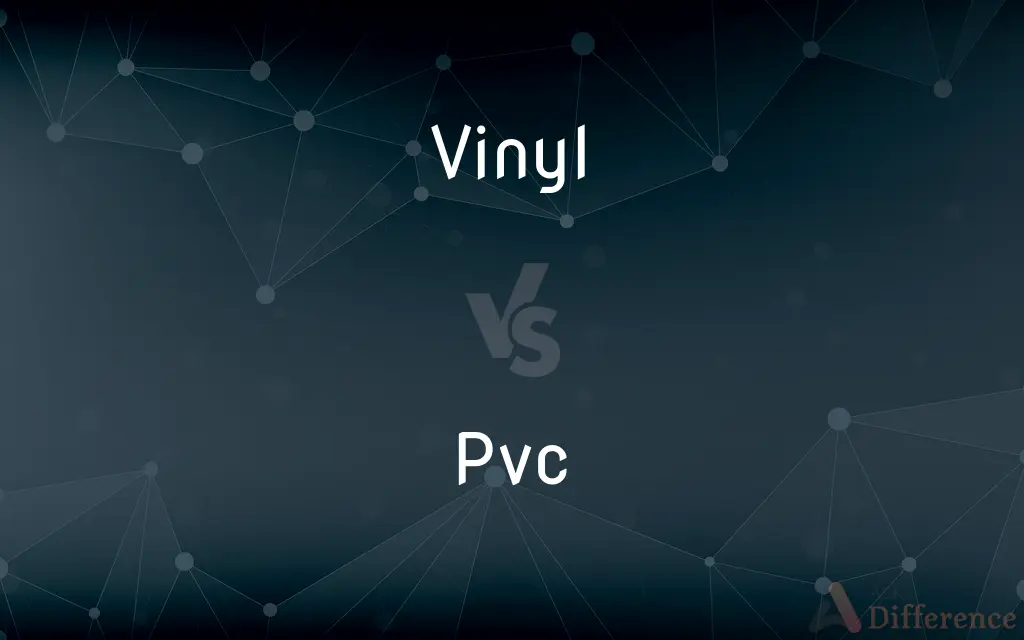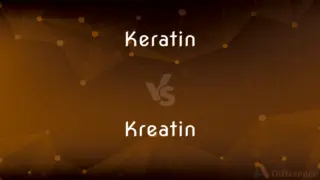Vinyl vs. PVC — What's the Difference?
By Urooj Arif & Fiza Rafique — Updated on April 15, 2024
Vinyl is a versatile synthetic resin used in various products, while PVC, or polyvinyl chloride, is a specific type of vinyl primarily used in construction and plumbing.

Difference Between Vinyl and PVC
Table of Contents
ADVERTISEMENT
Key Differences
Vinyl is a general term for a range of synthetic polymers derived from ethylene, used in everything from clothing to automotive applications, whereas PVC, short for polyvinyl chloride, is specifically used for its strength and durability in products like pipes and window frames.
Vinyl products are often soft and flexible, making them ideal for records, upholstery, and clothing; on the other hand, PVC is rigid and robust, preferred in construction materials due to its resistance to moisture and chemicals.
The production process of vinyl can vary depending on its application, involving additives that enhance flexibility and color, while PVC manufacturing typically involves the addition of plasticizers like phthalates to make it more pliable in certain uses.
Environmental concerns with vinyl include the release of harmful chemicals during manufacture and disposal, whereas PVC specifically is notorious for chlorine content, which contributes to its environmental impact, particularly when burned.
For recycling, both vinyl and PVC pose challenges due to the range of additives used, but PVC recycling is more standardized in the industry, with specific programs and guidelines aimed at minimizing its ecological footprint.
ADVERTISEMENT
Comparison Chart
Composition
Synthetic polymer derived from ethylene
Specific type of polymer called polyvinyl chloride
Flexibility
Generally more flexible, varies by product
Typically rigid, can be made flexible with plasticizers
Common Uses
Clothing, records, upholstery
Pipes, window frames, flooring
Environmental Impact
Releases harmful chemicals, difficult to recycle
Contains chlorine, recycling is more standardized
Durability
Depends on the formulation, generally less durable
Highly durable, resistant to chemicals and moisture
Compare with Definitions
Vinyl
Associated with certain health and environmental concerns.
Environmentalists raise concerns about vinyl production impacting local ecosystems.
Pvc
Prone to releasing harmful dioxins if burned.
Burning PVC waste is highly discouraged due to toxic emissions.
Vinyl
A synthetic resin or plastic consisting of polyvinyl chloride or a related polymer, used for various applications.
Vinyl flooring is popular due to its cost-effectiveness and durability.
Pvc
Contains additives that can be tailored for different levels of rigidity.
Flexible PVC is used in the manufacturing of garden hoses.
Vinyl
Often used in music industry as medium for records.
The new album was released on both CD and vinyl.
Pvc
Known for its durability and resistance to environmental factors.
PVC windows are favored for their long lifespan and minimal maintenance.
Vinyl
Can be produced in various colors and textures.
The designer opted for a bright red vinyl upholstery.
Pvc
A rigid plastic commonly used in construction and plumbing.
PVC pipes are essential for modern plumbing systems.
Vinyl
Flexible and can be used in soft products.
Vinyl gloves are commonly used in food service.
Pvc
Often recycled within the construction industry.
Recycled PVC is frequently used in building new housing.
Vinyl
Synthetic resin or plastic consisting of polyvinyl chloride or a related polymer, used for wallpapers and other covering materials and for gramophone records
The vinyl is cut to size with a craft knife
Vinyl floor tiles
Pvc
A polymer of vinyl chloride used instead of rubber in electric cables
Vinyl
Of or denoting the unsaturated hydrocarbon radical —CH=CH₂, derived from ethylene by removal of a hydrogen atom
A vinyl group
Pvc
Irregularity of cardiac rhythm; recurrent occurrences can be a precursor of ventricular fibrillation
Vinyl
The univalent hydrocarbon group CH2=CH, derived from ethylene.
Vinyl
Any of various compounds containing the vinyl group, typically highly reactive, easily polymerized, and used as basic materials for plastics.
Vinyl
Any of various typically tough, flexible, shiny plastics, often used for coverings and clothing.
Vinyl
Phonograph records considered as a group
A secondhand store that buys and sells vinyl.
Vinyl
The univalent radical CH2=CH−, derived from ethylene.
Vinyl
(countable) Any of various compounds and substances containing the vinyl radical, especially various tough, flexible, shiny plastics.
Vinyl
Phonograph records as a medium.
Many DJs prefer vinyl to CDs.
Vinyl
A phonograph record.
Vinyl
(chemistry) Containing the vinyl radical.
Vinyl
Made of polyvinyl chloride.
Vinyl
(music) Pertaining to a phonograph record.
Vinyl
The hypothetical radical C2H3, regarded as the characteristic residue of ethylene and that related series of unsaturated hydrocarbons with which the allyl compounds are homologous.
Vinyl
A univalent chemical radical derived from ethylene
Vinyl
Shiny and tough and flexible plastic; used especially for floor coverings
Common Curiosities
What are common uses of PVC?
PVC is commonly used in construction for items like pipes, window frames, and vinyl siding.
Is vinyl the same as PVC?
No, vinyl is a broader category of synthetic resins, while PVC is a specific type of vinyl.
Are there environmental concerns associated with PVC?
Yes, PVC contains chlorine, which can be problematic in waste management and recycling.
What is vinyl made from?
Vinyl is made from synthetic polymers derived from ethylene.
How flexible is vinyl?
Vinyl's flexibility can vary widely based on its formulation and intended use.
Can PVC be recycled?
Yes, PVC can be recycled and is often done so within the construction industry.
Why is vinyl popular in the music industry?
Vinyl records are prized for their sound quality and nostalgic value.
What are the environmental impacts of using vinyl?
Vinyl production and disposal can release harmful chemicals, posing environmental risks.
How durable is PVC compared to vinyl?
PVC tends to be more durable, especially in construction applications.
Can vinyl be used outdoors?
Yes, but its suitability depends on specific treatments for UV and water resistance.
Share Your Discovery

Previous Comparison
Keratin vs. Kreatin
Next Comparison
Yin vs. YangAuthor Spotlight
Written by
Urooj ArifUrooj is a skilled content writer at Ask Difference, known for her exceptional ability to simplify complex topics into engaging and informative content. With a passion for research and a flair for clear, concise writing, she consistently delivers articles that resonate with our diverse audience.
Co-written by
Fiza RafiqueFiza Rafique is a skilled content writer at AskDifference.com, where she meticulously refines and enhances written pieces. Drawing from her vast editorial expertise, Fiza ensures clarity, accuracy, and precision in every article. Passionate about language, she continually seeks to elevate the quality of content for readers worldwide.















































